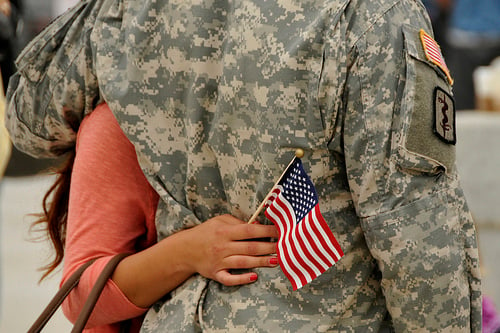Published on
Embracing The Veteran

Nearly every time I read an article about veterans in higher education the focus seems to be about the Post 9/11 G.I. Bill. Money is good. Higher education needs new revenue streams. However, lost in those articles is what higher education can do for veterans.
A little more than two years ago, my own institution was only concerned with the VA money that our few veterans brought to campus. In fact, we only knew of approximately thirty-nine students who were using the G.I. Bill to take classes, which was barely one percent of our total enrollment (Veterans Task Force, 2012). Additionally we had a poor reputation in the community for service to veterans; consequently, they avoided us.
The world changed before the 2010-2011 academic year. The Ohio Board of Regents made service to veterans an action item, and my institution embraced the concept.
- We created a task force to look at what we could do to change our reputation.
- We appointed an academic veteran counselor to get trained by the American Council on Education (ACE), to review military transcripts (AARTS for Army and SMARTS for Navy and Marine Corps), and to make recommendations on credit that can be awarded for military training and experience.
- We became a signatory to the Servicemembers Opportunity Colleges (SOC) Consortium agreement.
The military transcript review was our first real step. ACE extensively reviews military courses and makes recommendations for potential credit in an academic institution. The transcripts provide a description of the training. Furthermore, ACE evaluates military occupational specialties (MOS) and ratings to make credit suggestions based upon work experience. ACE has been involved in this process since 1945 (American Council on Education, 2011). All of these transcripts receive the same scrutiny as transcripts for other colleges and universities.
The Air Force channels their training through the Community College of the Air Force, which is a regionally accredited college. Course descriptions can be obtained from Maxwell Air Force Base.
To date 144 quarter hours of credit have been awarded to veterans since fall quarter 2010 (Veterans Task Force, 2012). All of this credit has been tied to academic programs at the institution. Consequently, there may have been some veteran credit that was not accepted because my institution does not offer a program in that area, for example, truck driving.
The SOC Consortium is the jewel of this process. At a recent meeting a Coast Guard recruiter lamented that during his Coast Guard career he has attended numerous colleges and seemed to begin again at each one (ETC Nathan R.Little, 2012). Colleges that belong to the SOC Consortium agree
- to liberally accept credit from other colleges and from military training and experience,
- to award credit for CLEP and other examination programs,
- to reduce residency requirements for veterans and active duty personnel, and
- to design plans of study that veterans and active duty personnel can begin at one institution and complete elsewhere (Servicemembers Opportunity Colleges, 2012).
The Consortium gets around the recruiter’s dilemma of always having to begin again. Unfortunately, admissions people seldom share this information with new students. It’s a one size fits all philosophy. To embrace the veteran, colleges need to identify these candidates early and get them in touch with the SOC counselor early in the academic career.
Presently we have an Army recruiter enrolled in our telecommunications technology program. We have already accepted credit from the colleges he had attended previously and from his AARTS. We know that he will receive permanent change of station (PCS) orders this year. Before that happens, we will finalize his course of study, identify courses that he will be able to take through distance learning, and provide contact information to coordinate with other institutions so that he can achieve his goal.
The final leg of our plan was the Veterans Task Force. It includes our VA certifying official and representatives from the business office, student services, admissions, and instructional services.
- We identify veterans. Our veteran enrollment is now over two percent of our total enrollment (Veterans Task Force, 2012). This includes everything between a recruit who hasn’t yet attended Basic Training to a retired Air Force Colonel.
- We had a Veterans Focus Group to identify what we could do to better serve veterans.
- We review unofficial transcripts as part of the admissions process to be proactive in awarding credit. As a student recently said, “I was recently contacted about sending my Army transcript in for possible credit. I didn’t have to talk to anyone. I was contacted. Service like that just can’t be beat” (Marion Technical College).
- We continue to build bridges with the local military recruiters; state and local veteran service counselors; the Ohio Department Job and Family Services; and veterans organizations like the American Legion, AMVETS, VFW, and DAV through an annual meeting to update them on what we’re doing as well as identifying what more we can do.
- We have taken part in Veteran’s Day ceremonies.
- We are planning our first Armed Forces Day celebration in May,
- We are revising policies and procedures to more fully comply with the guidelines of the SOC Consortium.
- Eventually, we will become a signatory to the Memorandum of Understanding with the Department of Defense for tuition assistance for active duty servicemembers.
Frankly, we have barely scratched the surface; however, we have become much more proactive in providing services to our veterans. Our reputation is improving. We do embrace our veterans and help them to achieve their goals.
——-
References
American Council on Education. (2011, December 14). ACE Military Programs. Retrieved March 28, 2012, from American Council on Education: http://www.acenet.edu/AM/Template.cfm?Section=Military_Programs
ETC Nathan R.Little, U. (2012, February 22). (J. C. Funk, Interviewer)
Marion Technical College. (n.d.). Veteran/Active Duty Student. Retrieved March 28, 2012, from Marion Technical College: http://www.mtc.edu/veterans/index.html
Servicemembers Opportunity Colleges. (2012, March 27). Servicemembers Opportunity Colleges. Retrieved March 28, 2012, from Servicemembers Opportunity Colleges: http://www.soc.aascu.org/
Veterans Task Force. (2012, February 23). MTC Veteran Affairs. Marion, Ohio, USA.
Author Perspective: Educator


